In recent years, science has focused on the effects of meditation on the brain in both experienced and new meditators. While we are still in the early stages of research, studies point to many benefits of meditation practice.
Training in mindfulness allows us to realize our potential and bring out the best in ourselves. By exercising the mind through meditation, we can perfect our wisdom and core qualities such as inner peace and freedom, clarity, compassion, and mindfulness. The more we develop these intrinsic qualities, the more inner space we have to deal with life’s ups and downs and to be open to others.
Matthieu Ricard
The benefits of meditation on the brain
Brain plasticity
Neuroplasticity, or brain plasticity, refers to the brain’s ability to adapt its structure and function through experience. Our neurons can regenerate and create new connections to adapt or recover from trauma or learning. When we learn a new concept or a new gesture, neuronal connections are created. Through repetition, the communication between neurons is strengthened, becoming faster and more efficient. Thus, the regular practice of an activity leads to the modification and strengthening of the area of the brain involved. This brain plasticity is not unique to children; although it slows down slightly as we age, it is still very much present in adulthood.

Meditation regularly stimulates and strengthens specific areas of the brain. . Antoine Lutz, director of research at the National Institute for Health and Medical Research (INSERM) in Lyon explains: “The regular practice of meditation has a physiological effect on the brain; it results in the activation of certain areas that control our attention, our emotions, our presence in the world and our relationshipto others”.
The state of scientific research
Sara Lazar observed the evolution of the brains of non-meditators before and after undergoing an eight-week cycle of MBSR (Mindfulness Based Stress Reduction) with a daily half-hour session. Her study showed :
- A thickening of the left hippocampus which leads to an increase in the density of gray matter in the cortex. The latter is necessary for the proper functioning of cognitive faculties, memory and emotional regulation. A previous study of experienced meditators in their fifties showed that their frontal cortex (which usually shrinks with age) was as thick as that of 25-year-olds.
- A thickening of the posterior cingulate cortex : the thicker it is, the less the mind rambles and the more realistic our perception of the world. This is what allows us to be present to the world in the moment, without judgment or anticipation.
- A strengthening of the pons, where many of the neuro-regulators that control breathing, sleep, heart activity and blood glucose levels are produced.
- Increased activation of the temporoparietal junction, which connects the temporal and parietal lobes. These two areas are involved in the acquisition, processing and response to sensory and cognitive information (attention, language, five senses, etc.).
- A reduction in the amygdala, which is involved in emotional recognition and learning behavioral responses, particularly to fear and anxiety.

These results support the conclusions of several studies on the benefits of meditation. In concrete terms, meditating regularly would help to strengthen concentration, improve memory capacity and reduce age-related memory loss. Learning to control and redirect one’s thoughts would also help to improve the quality and duration of sleep. Other positive effects of meditation include a reduction in the inflammatory and chemical effects of stress and improved anxiety management. Contemplative practices are used to help patients suffering from depression by reducing their debilitating negative thoughts. Through mental discipline, heightened emotional awareness, and self-knowledge meditation is also said to help develop a more positive self-image. Increasingly it is used as as a complementary therapy for patients suffering from addictions, anxiety, and other psychological disorders.
Meditative techniques in the treatment of psychological disorders
Meditation is used by some doctors in the treatment of psychological disorders, particularly depression and anxiety. A study of the use of mindfulness techniques in the treatment of psychiatric disorders was conducted with 12,000 patients between 2000 and 2016. It concluded that they were equivalent to clinical psychiatric treatments and superior to medical follow-up without treatment.
The explanation may lie in the work of Dr Steven Laureys, a Belgian neurologist who studied Matthieu Ricard’s brain. He found intense brain activity, regardless of the activity performed, and in particular in the left prefrontal cortex, which is involved in the emotional response. This area is connected to the regions of the brain responsible for controlling dopamine, noradrenaline and serotonin. Intense activity indicates a highly developed capacity to experience positive affect, in contrast to depressive states.
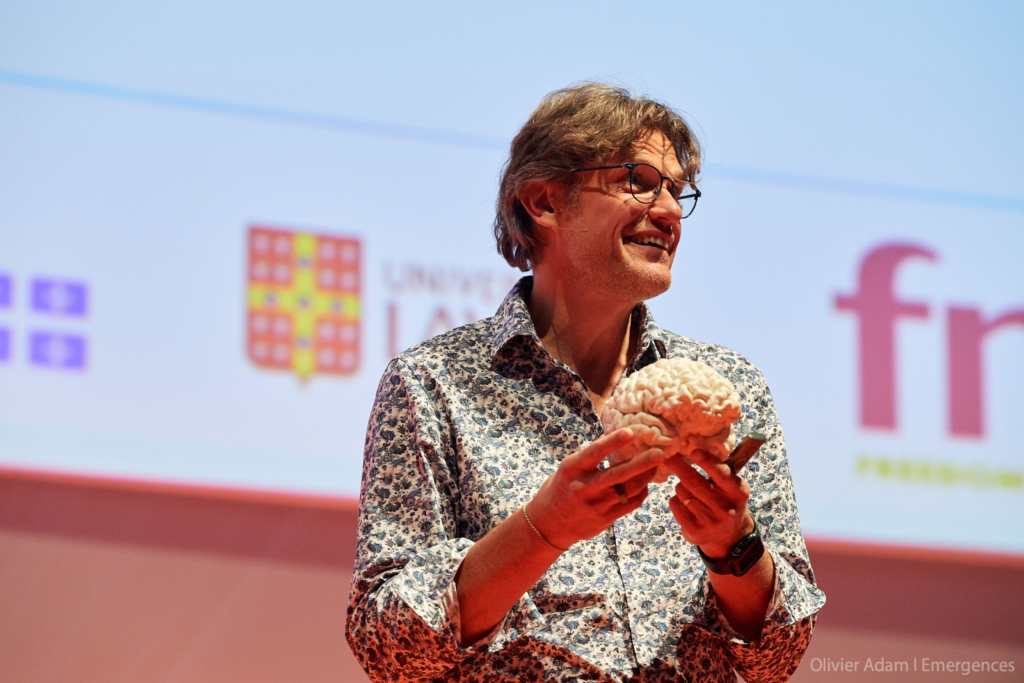
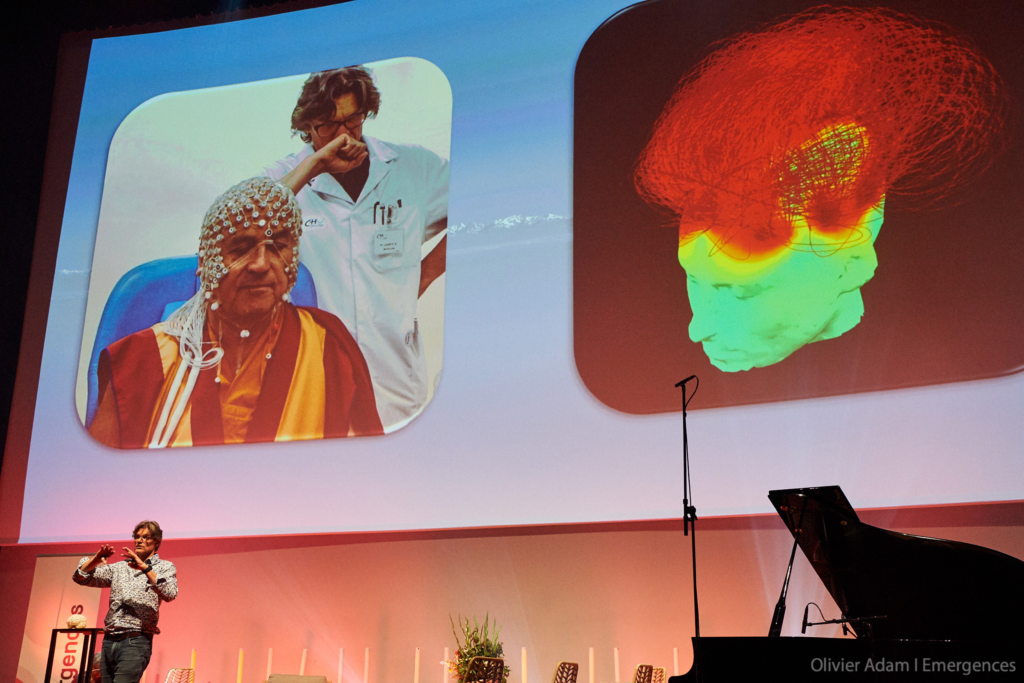
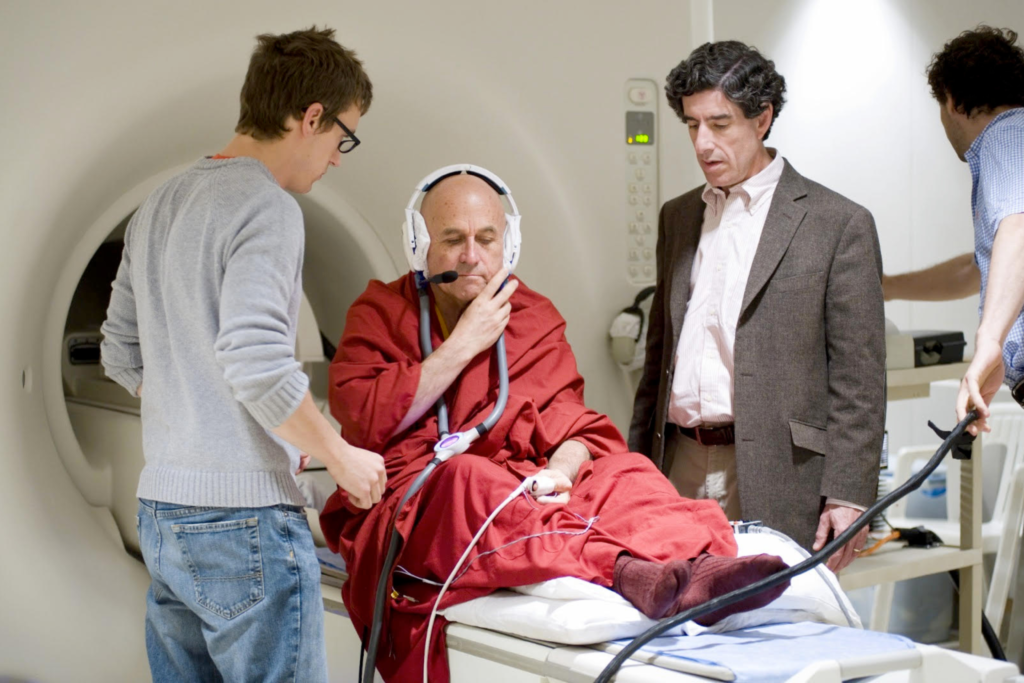
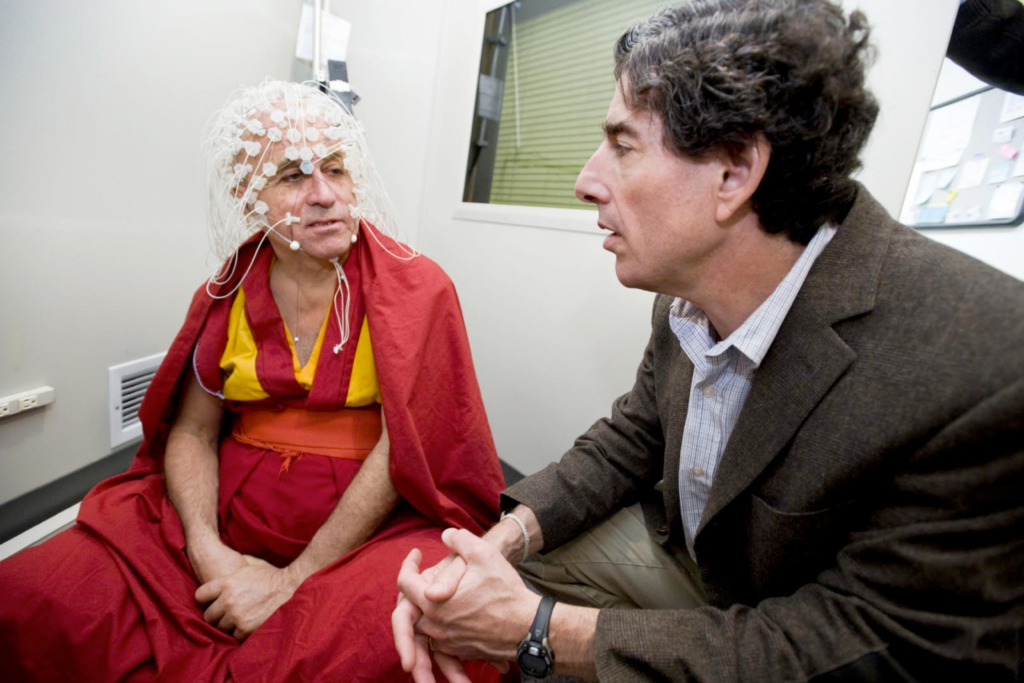
Meditation is also used to relieve chronic pain. Indeed, people who are experienced in meditation feel the pain with the same intensity but anticipate it less, which limits their suffering. They also find it easier to put it into perspective and get used to it.
Despite these promising findings, it is important to keep in mind that the use of meditation in health care is not a substitute for regular medical treatment. It should be used in addition to and under the supervision of trained physicians or instructors. In addition, about 8% of patients have reported unpleasant experiences or even negative effects, such as increased anxiety, panic attacks or distorted emotions.
Discover the exchange between Matthieu Ricard and Dr Steven Laureys
Meditation, caring and interconnection
Another effect of meditation is the ability to improve as a human being. Indeed, it allows us to know ourselves and to identify our defects and margins of progress to reach an “optimal mode of being” (Matthieu Ricard). Everyone can then search for and find the “golden nugget” that is buried within them and polish it, every day. Training the mind is a way of controlling emotions, such as anger or sadness, of freeing oneself from negativity and thus of behaving more calmly. In parallel, we can use meditation to generate positive emotions such as kindness or joy, to feel empathy and compassion for others, and to nurture our benevolence and selfless love. This insight and subsequent action can then be spread to benefit all sentient beings.
We spend a lot of time improving the external conditions of our lives, but in the end it is always the mind that creates our experience of the world and translates it into well-being or suffering. If we transform the way we perceive things , we transform the quality of our life. This is the kind of transformation that the training of the mind, which is called “meditation”.
Matthieu Ricard, in Brain and Meditation, with Wolf Singer
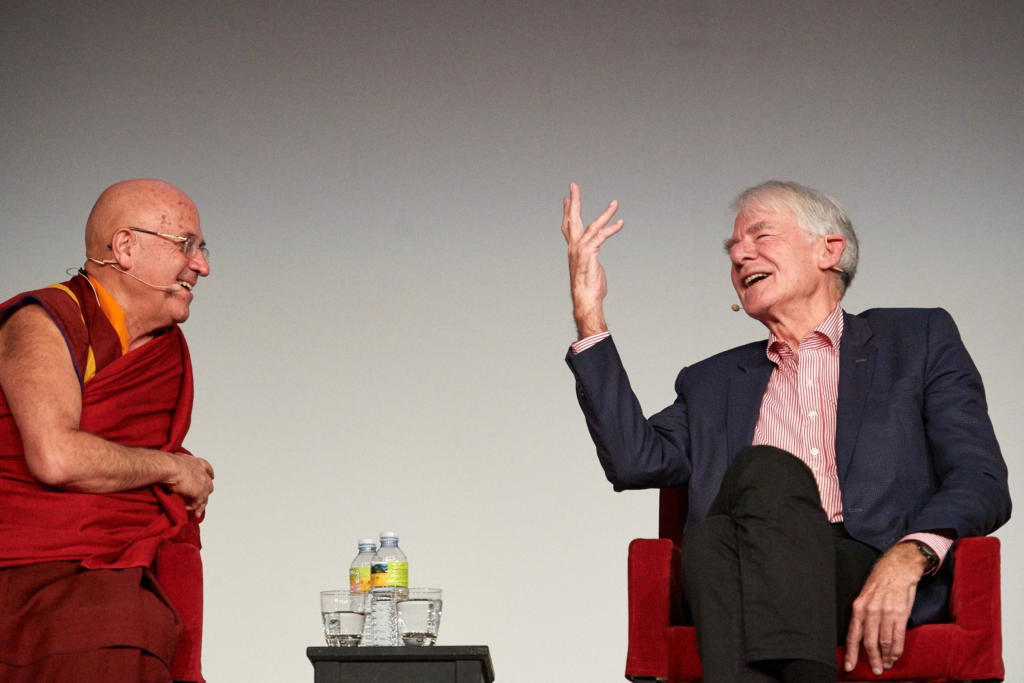
Because the way we act is necessarily influenced by our mind, cultivating an altruistic mindset means adopting an attitude and actions that are congruent. We become more open and tolerant, able to differentiate between criticism of our opinion and criticism of ourselves. We welcome divergent opinions in an objective manner, without being guided solely by our own convictions or emotions. This makes it easier to accept a plurality of points of view, which allows for constructive and respectful debates on each other’s thoughts. Such transformations on an individual level contribute to the transformation of society, which is nothing other than the sum of our individual behaviors. To practice is therefore also to participate in building a more altruistic world, according to one’s own capabilities.
Meditation may not be enough to change the world, but it is necessary. It is a tool that gives us the ability to face the world with hindsight, humility and discernment.
Christophe André
Discover the exchange between Matthieu Ricard and Wolf Singer
Meditation for children

Meditation is now being used in some classrooms and by some professionals, especially health professionals, with children. Research has shown that meditation produces similar results to those of adults. However, the prefrontal cortex area is less developed in children than in adults. This explains why distraction methods commonly used to relieve anxiety or distress, which involve this area of the brain, are less effective in younger children. Meditative methods should therefore be adapted to the age of the recipients.
Read our article about meditation for children
Study results to be confirmed
Although studies on the effects of meditation have increased in recent years, they are still fewer in number and often less rigorous than the traditional research on Western medical treatments.
Other limitations have included the influence of funding sources on the interpretation of the results, the variability in the amount of time between the initiation of meditation and subsequent quantifiable changes, the long term effects and duration of these changes, and the influence of an individual’s lifestyle (number of hours of sleep, extra activities, nutrition, social support).
Although the scientific explanations and verification of how meditation actually works are still evolving , it is apparent that meditating regularly has many benefits. Ultimately meditation is a personal journey, which must resonate with you and is a path towards helping you feel better and improve yourself.
Find all our resources to
cultivate your altruistic mindset
Beginning meditation
So how do you benefit from the effects of meditation? Specialists recommend practicing fifteen to thirty minutes a day, regularly, to improve concentration and awareness. Some studies suggest that contemplative practice may produce positive results within the first few minutes for some beginners..
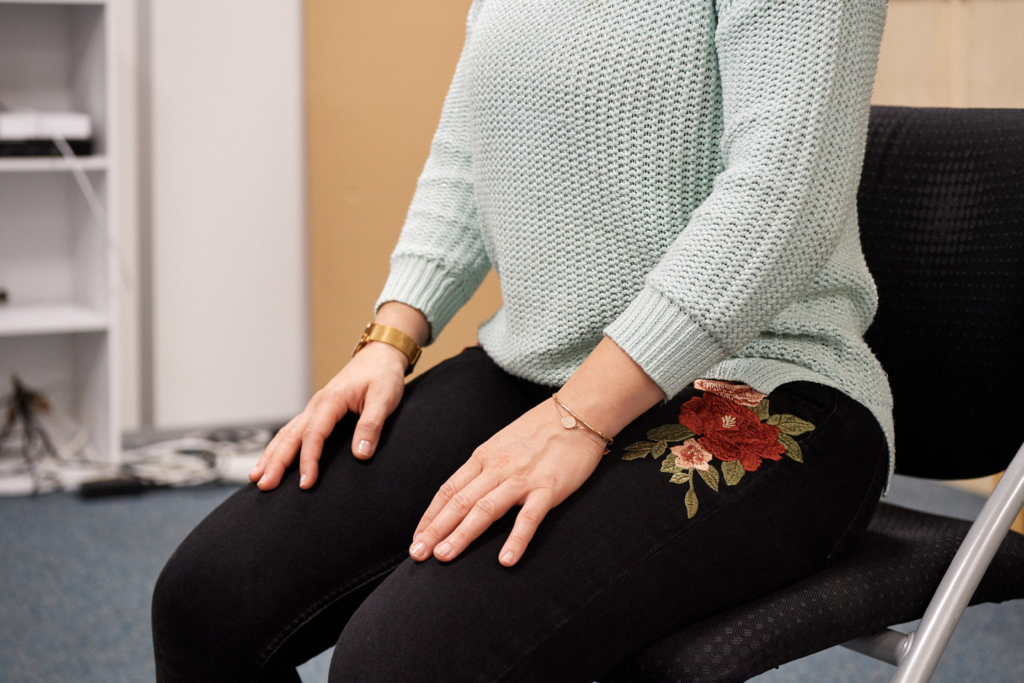
It is also important not to idealize meditation. Jon Kabat-Zinn says, “meditation may not change our lives overnight and meditating can be hard at first. Just as you don’t become a black belt in karate or learn the splits in two months, you don’t become an expert in meditation immediately. The two-hour meditation sessions will not be for now, and after one session we will not have the brains of people who have been practicing meditation regularly for years.
Moreover, recalls the man who conceptualized the MBSR programme :
Life itself is the real meditation, not just the time we spend sitting in meditation.
Jonn Kabat-Zinn
For the beginner , guided meditation exercises can be more accessible. By trying the different kinds of secular meditations that exist (body scanning, breath control, moment to moment mindfulness…) each person can find the one that suits them and progress at their own pace. The important thing is to persevere despite the inevitable difficulties : regularity is more important than quantity in order to see progress.
Find all our guided meditations
on our Youtube channel
Sources
- “Meditation and Mindfulness: What You Need To Know”, National Center for Complementary and Integrative Health
- “Mindfulness-based interventions for psychiatric disorders: A systematic review and meta-analysis”, Simon B.Goldberg, Raymond P.Tucker, Preston A.Greene, Richard J.Davidson, Bruce E.Wampold, David J.Kearney, Trac, L.Simpson, Clinical Psychology Review, vol.59, February 2018
- Meditation for Mental Health: How Does Mindfulness Compare to Other Treatments?”, Sheila Kinkade, Mind & Life Institute, January 25, 2019
- « Caring Mindfulness at the Service of Others », Matthieu Ricard, 8 october 2019
- “Exploring the Effects of Meditation Techniques USed by Mindfulness-Based Programs on the Cognitive, Social-Emotional, and Academic Skills of Children: A Systematic Review”, Frontiers in Psychology, vol.12, 2021
- “Meditation holds the potential to help treat children suffering from traumas, difficult diagnosis or other stressors – a behavioral neuroscientist explains”, Hillary A. Marusak, The Conversation, September 8, 2022